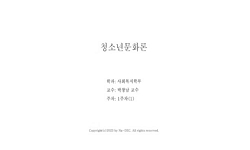유신체제기 한국 문학이 주로 박정희 시대를 기적에 가까운 생산도구의 개선을 가져왔지만 그 과정에서 자연과 인간의 삶이 근대화라는 ‘악마의 맷돌’에 으깨어지는 파국적 경험으로 포...
http://chineseinput.net/에서 pinyin(병음)방식으로 중국어를 변환할 수 있습니다.
변환된 중국어를 복사하여 사용하시면 됩니다.
- 中文 을 입력하시려면 zhongwen을 입력하시고 space를누르시면됩니다.
- 北京 을 입력하시려면 beijing을 입력하시고 space를 누르시면 됩니다.

문화학 : 예외상태로서의 박정희 시대와 남성 주체의 형성 - 최인호의 초기작을 중심으로 - = The revitalizing reforms system in exception condition and the formation of resisted-male subjectivity - centering as an early work of Choi In Ho -
한글로보기https://www.riss.kr/link?id=A101806241
- 저자
- 발행기관
- 학술지명
- 권호사항
-
발행연도
2016
-
작성언어
Korean
- 주제어
-
KDC
800.000
-
등재정보
KCI등재
-
자료형태
학술저널
- 발행기관 URL
-
수록면
673-700(28쪽)
- 제공처
- 소장기관
-
0
상세조회 -
0
다운로드
부가정보
국문 초록 (Abstract)
유신체제기 한국 문학이 주로 박정희 시대를 기적에 가까운 생산도구의 개선을 가져왔지만 그 과정에서 자연과 인간의 삶이 근대화라는 ‘악마의 맷돌’에 으깨어지는 파국적 경험으로 포착하고 있다면 최인호 소설의 위치는 다소 독특하다. 그는 청년문화세대의 기수로 다양한 취향, 습속, 문화의 향유를 개인의 권리로 내세움으로써 박정희 시대의 통치성과 충돌한다. 최인호의 문학은 박정희 시대 통치성의 핵심인 생명정치의 작동대상이 된 남성의 육체를 포착함으로써 그간 전체주의, 파시즘이라는 거대한 개념들에 가려져 잘 알려지지 않았던 문화정치와 성정치 등 억압적인 시대의 속살을 드러낸다. 박정희 시대에 새로운 인간의 창조 혹은 개조라는 측면에서 신체 정치의 기획이 광범위하게 이루어졌다는 점은 주지의 사실이다. 인간개조 프로젝트는 남과 여를 구분하지 않았지만 여성보다 남성이 사회의 주역으로 여겨졌으며, 건강한 육체는 지배적 남성성의 관념을 구성하는 중핵이었다. 최인호가 문단에 데뷔한 문제작을 선보인 60년대 말부터 1970년대에 이르는 시간은 국가가 법의 이름으로 폭력을 독점하고 사람들의 주거, 신체, 일상, 문화, 내면을 전횡적으로 통제한 ‘비상사태’가 일상이 된 시대였다. 초법적 명령으로서 긴급조치는 국가권력이 법적 질서를 파괴하면서 만들어낸 예외상태였다. 유신체제는 위계질서를 중시함으로써 각 개인의 개별화를 엄폐하고 개성을 잘못된 독단, 비뚤어짐의 징후, 타락으로 치부함으로써 대중지배를 꾀했다. 박정희 정권은 국가 자체가 군대가 되어 군사화된 개인, 군인인 남성을 국가의 유일한 성원으로 제시하고, 군사문화를 자연질서인 양 몸에 익히도록 강제함으로써 ‘지배적 남성성’을 만들어갔다. 지배적 남성성은 일종의 스테레오 타입으로 자리잡아 비헤게모니적 남성성에 대한 배제를 통해 확인되는데, 청년과 하위계급 남성 등 주변부 남성성은 고결함을 결여하고 있다고 간주되었다. 규율권력이 강화되던 60년대 후반부터 70년대 초반을 배경으로 한 최인호의 소설들은 지배적 남성성에 미달하거나 혹은 그것으로부터 탈주하는 남성의 경험을 서사화한다.
다국어 초록 (Multilingual Abstract)
Under the revitalizing reform system, the Korean literature had prescribed the Park Chung Hee era as the catastrophic experience in which nature and human life had been mashed by ‘the milestone of the devil’ called as modernization, even if produc...
Under the revitalizing reform system, the Korean literature had prescribed the Park Chung Hee era as the catastrophic experience in which nature and human life had been mashed by ‘the milestone of the devil’ called as modernization, even if production tool had been developed little short of miraculous in the era, on the other hand, the position of Choi In Ho‘ work is a little bit particular. He has clashed against governmentality of the Park Chung Hee era as a leader of youth culture generation, as asserting various tastes, convention and enjoying culture for individual right. The Choi In Ho‘ literature has showed bare skin of the repressive era such as cultural rule and gender politics that were not known well because it was surrounded in the massive concept of fascism and totaitariarism, as capturing the male’s body that became a target of operation for live politics that was a key in the rule of the Park Chung Hee era. In the Park Chung Hee era, it is very true in that the project of body politics was performed widely on the side of creating a new man or transforming. The project of transforming a man didn‘t distinguish between man and woman, but man was considered as the leading role in the society and an healthy body was the core of the resisted male concepts. The time from the end of 60‘ to 70’ when Choi In Ho debuted on the literary world and showed off a controversial work. The emergency measure out of the law was an exception that was made by the power of the state destroying the rule of law. The revitalizing reforms system tried to control the public, as cutting off an individual style and treating it as a dogma, a sign of a crocked mind and corruption against the order of rank. The Park Chung Hee regime presented a militarized male, a soldier male as a unique member of the state that became its military, made ‘dominant masculinity’ as laying the public under military culture. As dominant masculinity settled down as a kind of stereotype, it could be seen while excluding anti-hegemonic masculinity, so it considered that minor man on the periphery of dominant masculinity, such as young man and subordinates, didn‘t have high-minded. The Choi In Ho‘s works, having the background from the end of 60’ to the beginning of 70‘ when rule power strengthened, described the experiences of the man that was lack of dominant masculinity or escaped from it.
동일학술지(권/호) 다른 논문
-
어문학 : 한국한자음(韓國漢字音) 함(咸),심섭운(深攝韻)의 모태(母胎)별 층위(層位)에 대하여 - 일본한자음(日本漢字音)과의 비교(比較)를 중심(中心)으로 -
- 조선대학교 인문학연구소
- 최지수 ( Ji Soo Choe )
- 2016
- KCI등재
-
특집1: 테크놀로지, 이미지, 권력 : 디지털 시대, 확산매체와 성공매체 사이의 긴장
- 조선대학교 인문학연구소
- 정성훈 ( Sung Hoon Jung )
- 2016
- KCI등재
-
특집2: 한국사상과 선산철학 : 이원구 산업론의 역학적 체계
- 조선대학교 인문학연구소
- 이선경 ( Suhn Gyohng Yi )
- 2016
- KCI등재
-
특집2: 한국사상과 선산철학 : 『소학』을 통해 본 조선시대 여성상
- 조선대학교 인문학연구소
- 이영란 ( Young Ran Lee )
- 2016
- KCI등재





 KISS
KISS




